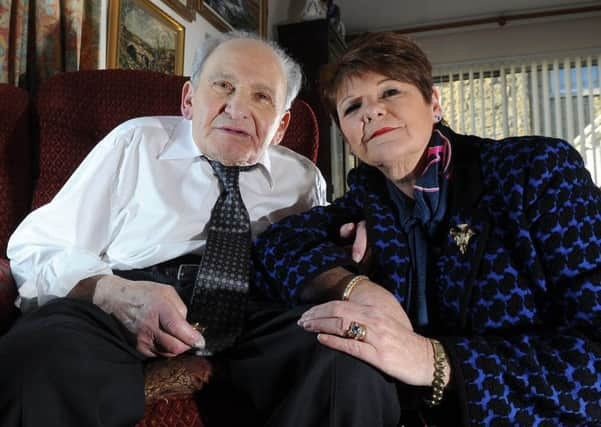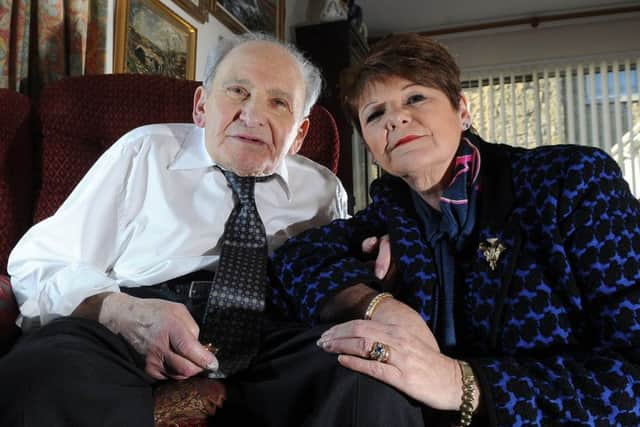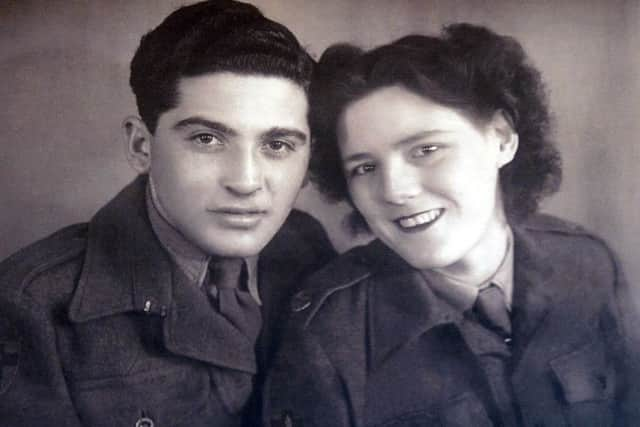Video: Holocaust survivors’ warning from history


The 86-year-old was a youth of just 16 when German forces arrived at the family home in Hungary as he returned home from school on May 14 1944.
As he approached his house, he saw an SS man hit his mother across her face and push her onto a lorry.
Advertisement
Hide AdAdvertisement
Hide AdSoon afterwards, his family and other members of the Jewish community were ordered into railway cattle trucks and transported to Auschwitz-Birkenau.


His happily home life shattered, he was left feeling numb and very afraid as the train approached what he soon learned was an extermination camp.
“When we arrived at Auschwitz-Birkenau, I saw dogs and SS. All the females went to the left, and males to the right.
“I saw my mother and sisters being marched away. There was no opportunity to kiss or say goodbye. I never saw them again.”
Advertisement
Hide AdAdvertisement
Hide AdAfter being separated from his mother and sisters, his father was also taken away.


Mr Black - who was born Jeno Schwartz - was marched away with men and boys who had been selected for slave labour.
“As we set off, I saw chimneys blazing away and there was a horrible smell all over the camp. I didn’t know what was happening but that morning a friend of my father said ‘I’m sorry to tell you, the smoke and smell you witnessed was the bodies of our own families burning. That is how I learned what was happening.”
Mr Black became just a number, 55546, and was given a striped uniform after all his hair was shaved off.
Advertisement
Hide AdAdvertisement
Hide Ad“I lost my identity, my name. I lost everything in Auschwitz. I was completely lost, numb in every possible way. I went from living a normal life to a hellhole.”
After around 10 days he was sent to Dora Mittelbau in the Harz mountains in northern Germany where the Nazis were using slave labourers to manufacture V1 and V2 rockets at underground sites.
His job there was to load small trucks with rocks dug out from tunnels for 12 to 14 hours at a time, without rest and on little food.
After five months he developed pneumonia and was taken to a prison hospital where he was treated by a German doctor who had been wounded on the Eastern front.
Advertisement
Hide AdAdvertisement
Hide Ad“He came to me every morning for about 10 days. He was a nice fellow. He used to say ‘where is my little Jew?’ After the war I tried to trace him because he saved my life.”
In March 1945 Mr Black was sent to Bergen-Belsen, a concentration camp in what today is Lower Saxony in northern Germany.
Seventy years on Mr Black does not like to talk about the scenes he witnessed at his final camp.
The place was littered with the bodies of the dead and the dying.
He was liberated by British forces on April 15 1945.
Advertisement
Hide AdAdvertisement
Hide Ad“I was a 17-year-old boy and an orphan. I was treated marvellously by the British Army and I got better.”
For a while he worked as an interpreter for the British and met his future wife, Annie, who he went on to have four children with.
Mr Black is now a widower and lives in Pool-in-Wharfedale, near Leeds.
He talks to school children, prisoners and community groups about his life and is an active member of the Leeds-based Holocaust Survivors’ Friendship Association.
Advertisement
Hide AdAdvertisement
Hide AdWhen he talks to teenagers, noisy classrooms fall silent and some are in tears by the end.
Like many of those who survived, he is still finding out more details from German archives about what happened to his family.
For over 60 years he believed his sisters had died in the gas chambers of Auschwitz.
Only recently did Mr Black and his daughter Lilian discover the true fate of 22-year-old Paula and 20-year-old Jolan.
Advertisement
Hide AdAdvertisement
Hide AdThe sisters had spent three months in Auschwitz before being selected for slave labour. They were sent to work in a factory producing fuel which was bombed by the RAF on September 11 1944.
The raid killed 151 Hungarian Jewish women, including Paula and Jolan.
Discovering what happened to them was one of the saddest episodes of Mr Black’s life.
Seven decades after Auschwitz was liberated by the Soviet Red Army, Mr Black says it remains important for him to continue giving talks for a long as he is able.
Advertisement
Hide AdAdvertisement
Hide Ad“It is very important, after all these years, because man can be very cruel and we have got to live in harmony.”
“I think every one of us has the responsibility to do our utmost to remember those events and make sure they never happen again.”
His daughter Lilian, chairman of the Friendship Association, said: “It is a story about survival and about how life went from ordinary to genocide.”